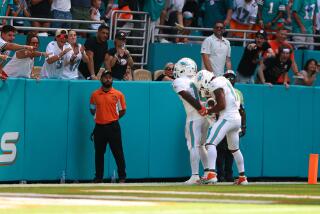A Foul on ‘Silk’
- Share via
Businessman and former Laker star Jamaal Wilkes had every right to complain about two Los Angeles police officers on a robbery detail who pulled him over and handcuffed him during a routine traffic stop. That kind of humiliating harassment is an unfortunate part of life for many law-abiding black men.
Wilkes (“Silk,” as he’s known to fans nationwide) was stopped blocks from his office in the Mid-Wilshire district. Why? Because his registration was about to expire, Wilkes says he was told by the officers at the scene. Since when is that a violation? They hand-cuffed him, police say, because a computer check first registered an outstanding felony warrant, then later showed a clear record.
Wilkes complained. The officers later said they stopped him because a tiny light above his license plate was out. That is disputed by Wilkes, who believes he was stopped and hand-cuffed only because he is a black man.
When to use handcuffs is certainly a judgment call that should be left up to officers on the scene. They face a potentially volatile situation when they stop someone in car. But sensitivity is part of sound judgment.
The Los Angeles Police Department captain in charge of the Wilshire Division made that point to his troops. Captain J. I. Davis also wrote a letter of apology to Wilkes for the lack of a thorough explanation of why the former athlete had been detained and for any embarrassment. More important, Davis promised additional training for his officers.
The Wilkes incident demonstrates the need to keep sensitive and accessible officers at the top of the department. Assistant Chief Jess Brewer--who retired Friday from the No. 2 position--was a tough cop and an advocate for equitable treatment of minorities inside and outside of the department. His replacement should have similar qualities.
The Wilkes incident raises many questions. Does the message from the top--which has improved in recent years--reach the patrol officers?
Are minority men in certain cars or certain neighborhoods considered automatically suspect? Is there extra scrutiny during traffic stops? A more challenging approach on the part of police officers? A greater tendency to order the motorist out of a car and reach for the handcuffs?
Do some officers see a potential felon behind every black face? Black men do commit a disproportionately high percentage of street crimes. But as John Mack of the Los Angeles Urban League points out, that sad reality does not give any cop carte blanche to suspect all black men, or violate their civil liberties.
The LAPD rightly apologized for the poor explanations Wilkes originally received from officers. But it’s troubling that the incident occurred at all.
More to Read
Sign up for Essential California
The most important California stories and recommendations in your inbox every morning.
You may occasionally receive promotional content from the Los Angeles Times.













